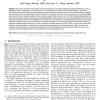Free Online Productivity Tools
i2Speak
i2Symbol
i2OCR
iTex2Img
iWeb2Print
iWeb2Shot
i2Type
iPdf2Split
iPdf2Merge
i2Bopomofo
i2Arabic
i2Style
i2Image
i2PDF
iLatex2Rtf
Sci2ools
TKDE
2008
2008
Discovering Frequent Agreement Subtrees from Phylogenetic Data
We study a new data mining problem concerning the discovery of frequent agreement subtrees (FASTs) from a set of phylogenetic trees. A phylogenetic tree, or phylogeny, is an unordered tree in which the order among siblings is unimportant. Furthermore, each leaf in the tree has a label representing a taxon (species or organism) name, whereas internal nodes are unlabeled. The tree may have a root, representing the common ancestor of all species in the tree, or may be unrooted. An unrooted phylogeny arises due to the lack of sufficient evidence to infer a common ancestor of the taxa in the tree. The FAST problem addressed here is a natural extension of the maximum agreement subtree (MAST) problem widely studied in the computational phylogenetics community. The paper establishes a framework for tackling the FAST problem for both rooted and unrooted phylogenetic trees using data mining techniques. We first develop a novel canonical form for rooted trees together with a phylogeny-aware tree ...
| Added | 15 Dec 2010 |
| Updated | 15 Dec 2010 |
| Type | Journal |
| Year | 2008 |
| Where | TKDE |
| Authors | Sen Zhang, Jason Tsong-Li Wang |
Comments (0)

